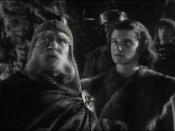Macbeth's speech (Act 1, scene 3, lines 128-142) is very important to the play's plot. This is because of three reasons. Firstly, the first truth is told from the witches' prophecies. Secondly, this extract shows Macbeth's reaction to the first prophecy coming true in his thoughts. Lastly, his speech shows the start of Macbeth's vaulting ambition.
The three witches revealed to Macbeth that he will soon become the Thane of Cawdor, and later onwards, the King. You see the plot slowly advancing when Macbeth is pronounced Thane of Cawdor by Ross and Angus, Kind Duncan's messengers, ("happy prologues to the swelling act of the imperial theme" Act 1, Scene 3, lines 129-130) Thus, with the first prophecy coming true, Macbeth's trust for the witches becomes slightly stronger as he starts to believe that "If chance will have me king, why chance may crown me".
Macbeth's speech shows his confusion and fear of what him becoming King could mean.
Macbeth was confused between good and evil, for example " If ill, why hath it given me earnest of success". Here Macbeth is wondering, if this supernatural persuasion is wrong, then why has it given me the honour of becoming Thane of Cawdor. Another example, " If good, why do I yield to that suggestion whose horrid image doth unfix my hair, and make my seated heart knock at my ribs". Here, Macbeth is questioning, if this is right, then why am I so afraid.
Macbeth is also afraid of what him soon to be becoming a King would mean to the present King, Duncan. If Macbeth were to be King, that would mean that both Duncan and his son Malcolm would have to die or be executed. Macbeth wasn't as much thinking about what might happen to...


